Indian Catholic Farmer Mala Sherpa: Putting “Laudato Si’” into Practice
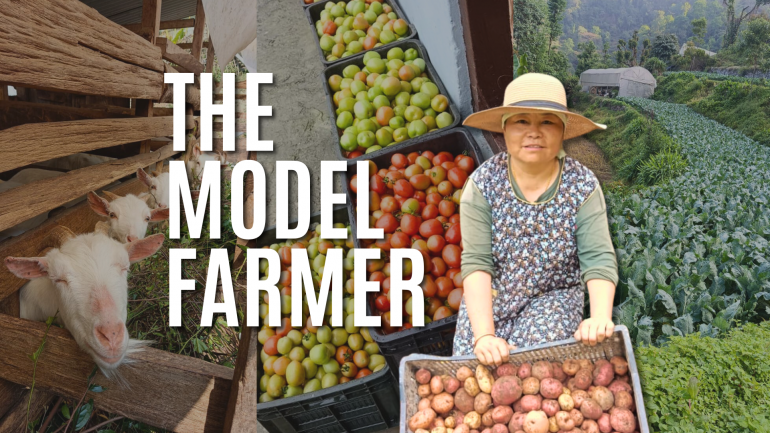
In the close-knit mountain community of Bul in South Sikkim, India—home to 285 farming families—Mala Sherpa, a Catholic woman farmer, stands out as a symbol of ecological stewardship.
Widely recognized as “a model farmer,” she has developed an exemplary Integrated Organic Farming System that demonstrates how traditional wisdom, scientific training, and deep spirituality can work together to sustain both land and people. Her work beautifully reflects Sikkim’s global distinction as the world’s first 100% organic state, a historic transition that has improved the lives of more than 66,000 farming families.
But for Mala, organic farming is not merely a profession. “It is my way of protecting God’s creation,” she says. “Organic farming is not only to protect myself—it is to protect our nature, our community, and the generations to come.”
Rooted in the Soil
Three generations live and work on Mala’s farm—her mother-in-law, uncle, aunt, husband, children, and extended family members. “We are nine in total,” she explains.
Like many Sikkimese households, the family shares responsibilities naturally and harmoniously. Her husband manages ploughing and livestock; elders sort vegetables, store seeds, and guide younger workers; the children help tend flower beds, poultry units, and seedling trays. Farming is not just shared labour but a way of life that binds the family together.
“Because farming here has a future, our youth stay in the countryside,” she says, her voice warm with pride. “They want to be farmers too.”
This reality stands in contrast to much of rural India, where young people leave for cities in search of work. For Mala, the answer is clear: dignity must return to farming.
“Value your roots,” she tells young people. “There is no place more peaceful than the countryside. You can do so much right here—and live sustainably.”
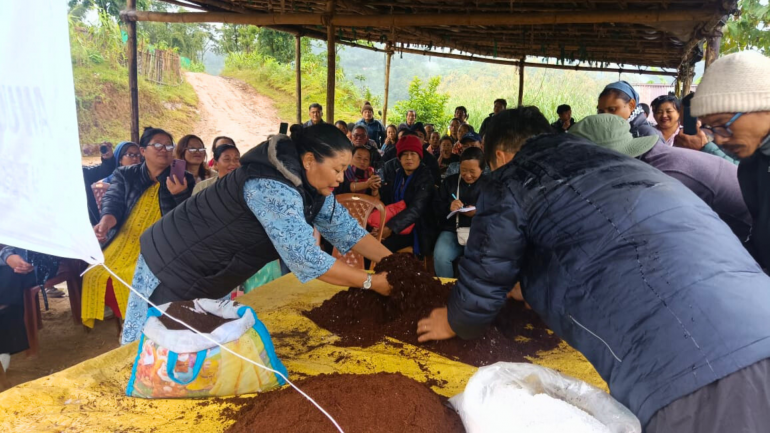
Formed by Education and Love for the Earth
Mala’s passion for organic farming began early. During her college years, she volunteered with an NGO called ATREE, working on biodiversity conservation. The experience awakened in her a deep commitment to protecting the environment—something that would shape the rest of her life.
After graduation, she worked for many years with the Sisters of St. Joseph of Cluny, helping manage their organic farm. This exposed her to growers, experts, and scientists from around the world. Motivated to deepen her knowledge, she later travelled to Allahabad, Uttar Pradesh, to undergo formal organic farming training at a non-formal education centre linked to a deemed agricultural university.
Her learning never stopped. “ Even now I regularly attends training sessions organized by the Government of Sikkim. I also conducts my own small-scale research on the farm.” As a recognised Organic Farming Trainer, she commits herself to continuous study so that she can effectively teach others.
Integrated Organic Farming System
Visitors immediately understand why her farm is renowned across South Sikkim.
“We have everything within one farm, and each part supports the other,” she explains.
Her farm is a fully integrated organic ecosystem, combining a wide range of complementary agricultural activities. It includes cattle, goats, and rabbits; seasonal and off-season vegetable cultivation; fish ponds; backyard poultry; and bee keeping. She also maintains kiwi orchards, bright flower fields, and forest patches that support local biodiversity. Alongside nursery management, she produces compost and vermicompost, ensuring that every component of the farm reduces waste and strengthens sustainability.
By relying primarily on on-farm resources, the family minimizes external inputs, enhances efficiency, and increases income. Large cardamom—one of Sikkim’s major cash crops—remains their strongest earner, while flowers and vegetables ensure steady income throughout the year.
“Organic agriculture has given us a secure future,” Mala says. “It should be practiced not only in Sikkim but throughout India and the world.”
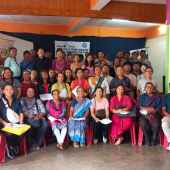
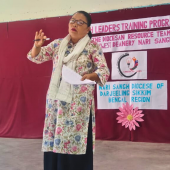
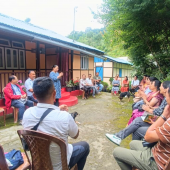
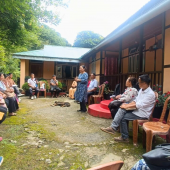
A Living Classroom
More than a farm, Mala’s land has become a year-round learning centre for South Sikkim. Students from elementary to college level, PhD scholars, women farmers, and rural youth—including school dropouts—visit regularly for hands-on training.
“We give both technical and practical instruction,” she explains. “We follow up with them and guide them in production and marketing. Many have started their own organic farms.”
Her deepest joy comes from training women. “When women learn farming, the whole family benefits,” she says. “They become confident and independent.”
Inspiration from Laudato Si’
For Mala, farming and faith are inseparable, and her family plays an active and visible role in the life of the Church. Her husband serves on the Catholic college’s managing committee, while she contributes her leadership as treasurer of the Basic Ecclesial Community (BEC). She is also an active member of the Parish Pastoral Council, the Family Commission, the Women’s Association, the Environment and Ecology Commission, and the Diocesan Resource Team. In addition, she dedicates time to mentoring the youth of her parish, offering guidance and encouragement rooted in her lived faith.
Her day begins with prayer, meditation, and Scripture reading. “When I work in the fields, I listen to gospel hymns,” she says. “And every important family decision is made after evening prayer and the Rosary.”
Her spirituality deepened further after reading Laudato Si’, Pope Francis’ encyclical on caring for our common home.
“It is my favourite church document,” she says with conviction. “Pope Francis reminds us that the earth is God’s gift. We must protect its resources so future generations can live with dignity.”
She sees every seed, every bud, every harvest as a sign of God’s love. “Farmers are co-creators with God,” she reflects. “Our work protects life—human life, animal life, plant life. Every day, I see God’s miracles in the fields.”
“Be Grateful. Care for Creation. Be a Role Model.”
To Catholics across Asia, Mala offers a message rooted in faith and lived experience:
“Creation is a wonderful gift from God. Conserve resources, reduce waste, and promote ecological balance. Be grateful for life—and be a role model for others.”
In the terraced fields of Bul, surrounded by fluttering prayer flags, mountain winds, and the quiet songs of birds, Mala Sherpa embodies what Laudato Si’ calls “ecological conversion”—a life shaped by gratitude, stewardship, community, and hope.
Through her work, she is planting more than crops. She is planting a future—one where people, creation, and God live in harmony.










“Organic farming is not just a method of cultivation; it is a way of honouring the earth, nurturing life, and receiving God’s gifts with gratitude.”
- Reply
Permalink